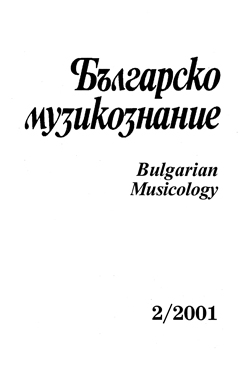Трудността да не бъдеш самия себе си (сценични и репертоарни превъплъщения на сватбарските оркестри и балканската традиционна инструментална практика)
The Difficulty of Not Being Yourself (stage and repertory transformations of the wedding orchestras and the Balkan traditional instrumental practice)
Author(s): Elisaveta Valchinova-ChendovaSubject(s): Music
Published by: Институт за изследване на изкуствата, Българска академия на науките
Summary/Abstract: Since 1985 there have been created festivals of the wedding orchestras or groups for instrumental folk music in Stambolovo. Even in this way, observing strict reulations and directions, the unique qualities of the musicians show. The followers of the most successful folklore musicians from the 1930s and the 1940s have appropriated the best traditions and developed a specific performance style of their own. To name a few among them, Hassan Chincheri (the violin player and composer), the family of Budakovi, the accordion players Boris Karlov, Ibro Lolov, Petar Ralchev, Traycho Sinapov, Ivan Milev, the clarinet players Dimitar Paskov-Tigara, the family of Malakovi, Ni.kola Iliev, Fekata, and the most successful - Ivo Papazov (lbryama), the groups from Trakia “Parvomayska”, “Lenovska”, “Sadovska”, “Konushevska”, “Kanarite” the group from Russe “Horo”, etc. New instruments are introduced in these bands -guitar, electric organ, modem percussions. The old winds seem to have grown obsolete, being replaced by the brilliance of the new ones. The prominent wind-musicians join mixed orchestras. In North Bulgaria, though, purely wind bands still exist. Professionally trained musicians usually take part in them. They work in military wind bands and in their free time make some extra money at wedding parties and other celebrations. With their music they obey the unwriten laws which characterise the playing of the Balkan chalga, as early as its initial distribution on the Bulgarian lands from the middle of the last century to the present day. Their repertoire is completely subjected to the taste of those paying for it even when in discrepancy with the artistic taste of the performers. Nowadays, alongside with the horo dances, predominant are the hits of the Balkan ethnopop, of a music of a popular song type, based on common Balkan musical sources. What defines them refers to their overall activity, the repertoire and the manner of playing. This bring together all chalga bands and include them as well in a new wave of the modem popular instrumental folk practices.
Journal: Българско музикознание
- Issue Year: 2001
- Issue No: 2
- Page Range: 118-127
- Page Count: 10
- Content File-PDF

